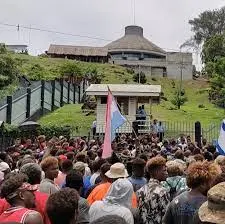A new focus of international conflict Have you previously read about the state of "Solomon Islands"?
On Thursday, the Solomon Islands lived through widespread protests demanding the resignation of Prime Minister Manasseh Sogavari, which quickly turned into violence that rocked the capital, Honiara. Observers of the conflict in the islands attribute the divided loyalties of its people between China and Taiwan.
Since Thursday morning, Honiara, the capital of the Solomon Islands, has lived through widespread protests calling for the resignation of the country's prime minister, Manasseh Sogavari. According to the French Press Agency, these protests included the burning of a number of buildings, and demonstrators tried to storm the parliament headquarters.
Meanwhile, local media reported looting in the city and said that the police were responding to the riots using tear gas canisters. Sogavari has vowed to track down the rioters, while the Pacific city remains under lockdown in the wake of the unrest.
In the same context, Australian Prime Minister, Scott Morrison, announced that his country would send peacekeeping forces to the Solomon Islands. The goal of these forces is to "establish stability and security," Morrison said, adding that he had received a request for help from Prime Minister Sogavari.
China also expressed "grave" concern about the escalation of events. "We call on the Solomon Islands government to take all necessary measures to ensure the protection of Chinese nationals and Chinese institutions," Chinese Foreign Ministry spokesman Zhao Lijian said in a press statement.
Why are they protesting in the Solomon Islands?
Since Wednesday, a number of Malaita residents have flocked to neighboring Guadalcanal, which includes the capital, Honiara, with the intention of protesting, calling for the prime minister to step down. Analysts attribute this to discontent over the deteriorating social conditions on the first island for decades, and at the capital's monopoly of all economic resources and their failure to share them with the rest of the archipelago's islands.
Another root of the conflict that has recently erupted is the shift in the country's foreign allegiance since Manasseh Sogavari took over. The latter sought to get closer to China rather than the local government in Malaita, an ally of Taiwan. Sinclair Dennin, an associate professor in the Department of Pacific Affairs at the Australian National University, said there was "a lot of indignation about this change behind the riots".
Since Sogavari's ascension to the head of the country in 2019, strong diplomatic relations with China have been announced. In return, Beijing promised Honiara economic aid and investments worth $500 million. This was condemned by Tsai Ing-wen, President of the Republic of Taiwan, saying, "We sincerely regret and strongly condemn the decision of the Solomon Islands government to establish a relationship with China."
The head of the local government in Malaita, Daniel Swidani, expressed his rejection of the government's decision. He said, "We strongly oppose the investments of the Chinese Communist Party, and we are fully aware of the risks of falling into the trap of Chinese debt, and we have seen through the experience of a number of countries how they found themselves stuck in this trap from which there is no way out." Swedani is widely popular within the most populous island of the archipelago, and is Taipei's closest ally in the country.
And the leader of the opposition in Solomon Islands, Peter Keniloria Jr., warned last month that "the country's foreign policy is largely controlled by China" and that this matter will lead the country into a spiral of violence where "we will not witness its escalation, but will suddenly surprise us with its explosion." "Our small country is on the front line of a major international geopolitical conflict, and our provinces are constantly exposed to Chinese aggression," he added.
A small country on the brink of an international conflict!
The Solomon Islands is located in the Pacific Ocean east of Australia, and consists of more than 990 islands, with a combined area of no more than 28.5 thousand square kilometers, inhabited by about 500,000 people. It is politically under the nominal sovereignty of the British Crown, and is administered by a Head of Government with an independent parliamentary system.
It is not the first time that the islands are located in the midst of a global conflict between the great powers. They lived through the scourge of World War II, as Japan and the United States of America fought a bloody battle to control their largest island, in what was called the Battle of Guadalcanal.
Nor is this the first time that the island has witnessed civil violence. Following the election of Prime Minister Snider Rini in 2006, a wave of violence erupted in which Chinese nationals residing on the island were accused of financing a bribe offered by a politician in order to obtain his position. At that time, a number of shops and the homes of the Chinese community in the capital, Honiara, were burned and looted, and losses were estimated at $37 million.






Good
ReplyDeleteGood
ReplyDeleteGood
ReplyDeleteGreat
ReplyDeletesmall country on the brink of an international conflict!
ReplyDeleteGreat
ReplyDeleteIt highlights the fragile stability in this geopolitically sensitive region.
ReplyDelete